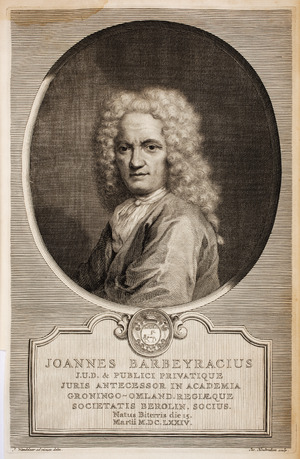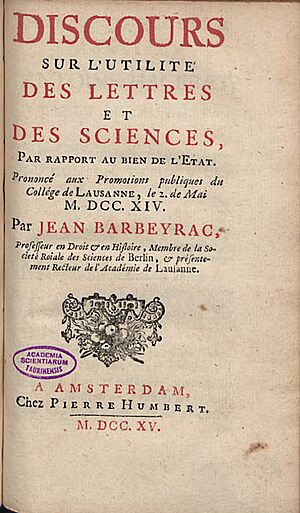Jean Barbeyrac facts for kids
Quick facts for kids
Jean Barbeyrac
|
|
|---|---|
 |
|
| Born | 15 March 1674 |
| Died | 3 March 1744 (aged 69) |
| Nationality | French |
| Occupation | Professor of law |
Jean Barbeyrac (born March 15, 1674 – died March 3, 1744) was an important French legal scholar. He became famous for his work on natural law and international law, especially through his detailed notes and translations of other well-known thinkers.
Contents
Jean Barbeyrac's Life Story
Jean Barbeyrac was born in a town called Béziers in France. His uncle, Charles Barbeyrac, was a famous doctor. Because of religious reasons, Jean and his family had to move to Switzerland. This happened after the Edict of Nantes was cancelled, which had given rights to Protestants in France.
After living in Geneva and Frankfurt am Main for a while, Jean Barbeyrac became a professor in Berlin, teaching subjects like literature. Later, in 1711, he moved to Lausanne to teach history and civil law. Civil law is the system of laws that deals with private relationships between people, like contracts and property. Finally, he settled in Groningen as a professor of public law. Public law deals with how the government works and how it relates to its citizens.
What Jean Barbeyrac Wrote
Jean Barbeyrac is best known for his work on a book by Samuel Pufendorf called De Jure Naturae et Gentium. This title means Of the Law of Nature and Nations. Barbeyrac translated this book and added his own long introduction and many notes. His introduction explained the history of moral science, which is the study of what is right and wrong.
His Ideas on Law and Morality
Barbeyrac largely agreed with the ideas of John Locke and Pufendorf. He believed that moral rules come from the commands of God. He also helped to show the difference between what is legally required and what is morally right. This idea was later explored more deeply by thinkers like Thomasius and Kant.
When it came to international law, which are the rules that countries follow when dealing with each other, Barbeyrac believed these rules should be based on natural law. Natural law refers to a system of moral and ethical principles that are believed to be inherent in human nature and discoverable by reason. He disagreed with some of the ideas of Hugo Grotius, another famous legal scholar. Barbeyrac also thought that a country's power, or sovereignty, is not like owning property. He even saw marriage as a civil contract, meaning it's an agreement between people under the law.
His Translations and Other Works
Besides Pufendorf's book, Barbeyrac also translated other important works. He translated Grotius's De Jure Belli et Pacis (On the Law of War and Peace), Cumberland's De Legibus Naturae (On the Laws of Nature), and Pufendorf's shorter book De Officio Hominis et Civis (On the Duty of Man and Citizen).
Barbeyrac also wrote some of his own books. One was called De la morale des pères (On the Morality of the Fathers). He also wrote a history of old treaties, which are formal agreements between countries. This was part of a larger collection of diplomatic documents. Interestingly, he also wrote a book called Traité du jeu (Treatise on Gaming) in 1709, where he argued that games of chance could be morally acceptable.
Images for kids
 | Delilah Pierce |
 | Gordon Parks |
 | Augusta Savage |
 | Charles Ethan Porter |



